From Davis
by Bijan Stephen

I was a dreamy kid, one who never really understood how the world worked: I always had my head in a book, was always trying to learn the way things were without ever facing them directly. Between my father’s medical journals and my Piers Anthony novels, I remember thinking I’d acquired a useful working knowledge.
I grew up in East Texas; last week, after 21 years, my family moved to Davis, CA. I arrived only days ago, but I already know how the days dawn around here: Sometimes misty, always silently. The rest is unfamiliar — the house, the town, the faces. It’s not a bad place to reflect on the year, far away from everything I’ve known.
My childhood never seemed real until I left for good and realized it was a large part of my identity. This is probably the result of never quite believing that I had to live in a place where race had anything to do with me.

2014 was the year black death finally made it back into the mainstream conversation. People are starting to realize our vaunted post-racial nation is still, in fact, stuck in the 60s — that, in so many ways, we haven’t moved meaningfully forward. If anything seems new, you haven’t been paying attention.
2014 was also the year I broke my promise to myself and started writing about race. To be a beat reporter for your own skin is exhausting, and vaguely humiliating. As Cord Jefferson put it:
When beginning any career, it’s important to highlight the experiences and skills you bring to the table that others can’t. For some marginalized writers, that means being direct about the fact that your personal perspective as a woman or homosexual or African American — or all three — will occasionally be perceived as refreshing in an industry so dominated by straight white men.
It’s a slippery slope, I told myself. If you start you’ll feel obligated to say yes to the assignments and editors that start turning up. Remember there’s a price: You give part of yourself in return for publication. Make sure you get enough.
This year — the year of Michael Brown and Eric Garner, of uncountable smaller indignities, of many thousands still gone — wasn’t really different than any from the decade before it, or from the ones before that. We’re still wrestling with the same issues. Progress came in the form of imperfect salves, too little and too late.
For me, 2014 was the year I was most aware of the world, in ways my younger self couldn’t have conceived. That there would be a firehose of news, an irresistible torrent of information, and that I would be a part of the cycle, was (and, for me, still sort of is) beyond imagining. I know a little bit more now, and I realize that in this moment, right here, right now, I am alive and living and things are real. I realize that this experience isn’t fake, and nobody’s behind the curtain. No one’s off-screen pulling strings.

I guess what I’m trying to say is I’ve realized that nothing has changed but us — nothing but you, nothing but me. If history is an emergent property of randomly mixed groups of people, then 2014 was part of it and 2015 will be, too. I’m not sure yet where hope fits in.
It’s nighttime in Davis. I don’t yet know what it’s like after the sunset.
Photo by Robert Baker
Never Better, a collection of essays from writers we love, is The Awl’s goodbye to 2014.
